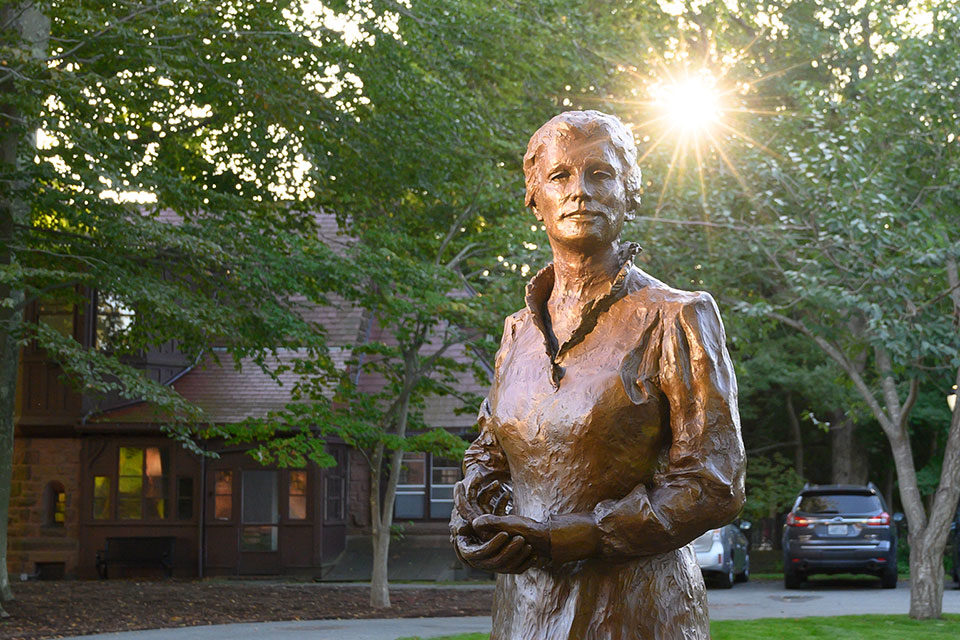Meet the Vision of Mercy Fellows serving their communities this summer

Each summer, the Vision of Mercy Fellowship offers undergraduate students an opportunity to participate in a high-impact, community-based experience rooted in the mercy mission of Salve Regina. Selected students work with organizations committed to the critical concerns of the Sisters of Mercy: immigration, earth, anti-racism, nonviolence and women.
Grant funding is provided by the Center for Community Engagement and Service. Vision of Mercy Fellows serve for at least five weeks for 30 hours per week with a nonprofit organization locally, domestically or abroad.
The Vision of Mercy Fellowship is intended as an opportunity for students who are discerning how best to dedicate their lives professionally or vocationally to the work of mercy.
Abigail Mensonides ’24, double major in social work and sociology and anthropology, minor in women, gender and sexuality studies
Mensonides is at a community-based organization called EDGE New Jersey, a social service organization based in Morris County. EDGE New Jersey responds compassionately and responsibly to those living with HIV, those at risk and LGBTQ+ communities by providing supportive services, housing opportunities, prevention strategies and education.
Mensonides believes that these offerings align with the values of the Sisters of Mercy in many ways. The main goal is to bring educational tools to the community partner so that they can learn how mercy and justice intersect with the existing services that the organization offers. In collaboration with EDGE New Jersey, Mensonides has designed an opportunity to fulfill her Vision of Mercy Fellowship and work to deepen the connection between her social work program at Salve Regina and experiences with the critical concerns of mercy.
Carina Gallagher ’24, double major in administration of justice and economics
The focus of Gallagher’s summer fellowship is on nonviolence and the opportunity to promote justice at Turning Around Ministries, which offers after-care services to previously incarcerated persons who are returning to Newport County from Rhode Island’s Adult Correctional Institution.
Gallagher plans to attend law school and stay in Rhode Island after graduation. It was through the stories of professors at Salve Regina that she decided to promote justice by being a lawyer, in the hope that she can give back to the community. Gallagher plans to help guide people when they are going through difficult times and give them a voice by promoting justice in the world, by using fair procedure and being an advocate for others in society.
“Nonviolence is a key aspect in law as it allows to eliminate discrimination and inequality in the world,” she said. “Laws are meant to solve conflicts and promote peace and safety in society, and laws ensure that all humans are granted their rights and prevent others from taking advantage of them. They are also meant to help provide justice in our society when disorder arises.”
Graysen Scherer ’24, social work major, minor in marketing
Scherer is working with Higher Edge in New London, Connecticut, which empowers and supports low-income, first-generation students to apply, enter and graduate from college. Scherer is creating informational sessions for students to talk and relate to each other about this phase in their life.
“I can see mercy in everyday life at Salve Regina through the students, faculty and staff,” she said. “And I hope to continue to see mercy throughout my schooling experience at Salve Regina, as social work is a field where mercy is necessary more so than any other career.”
Roseanne Lacy ’24, double major in French and psychology, minors in applied behavior analysis and neuroscience
Lacy partnered with St. Mary of the Assumption School in Brookline, Massachusetts, a nonprofit that is connected to her home parish. From mid-May to mid-June, she worked in the school both with the children and in the administrative offices. Due to the diverse background of the student body, Lacy created a project that allowed students to explore these different cultures and learn from one another. After identifying some of the countries that are represented in the backgrounds of the students, she helped students engage in a series of projects that would help to learn more about these countries. It is Lacy’s hope that this project will help students to embrace the cultural diversity of the school.

